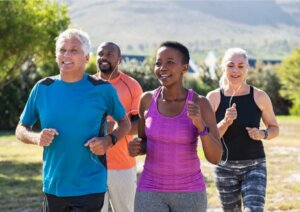The Mental Health Benefits of Running

Running has numerous mental health benefits, and whilst it might seem quite a dull, repetitive exercise, the truth is that it can have a huge impact on your overall well-being.
People often mistakenly think that running is simply about moving your legs quickly, but there are many different factors to take into consideration. For example, mental strength is important to withstand the unpleasant feelings and pain that can appear during a race.
This exercise is either one that you love or hate. But if you do love running, then read on to learn more about the amazing mental health benefits.
Running teaches you to push yourself harder
The main challenge in running is that you have to endure intense physical effort over a long period of time. But once you’re able to bear this unpleasant feeling, your perception will change.
And this is a valuable lesson for other areas of life too. You can always go the extra mile, even when you think you can’t.
Running can also have a big impact on your self-esteem as you set and achieve short-term goals. There are few things in life more rewarding than proving that you’re capable of something which initially seemed impossible.
It’s an effective way to deal with negative emotions

Negative emotions are part of being human. And as unpleasant as they are, you shouldn’t try to avoid them. Instead, it’s important to find ways of managing them and turning that discomfort into something more positive.
Going for a run is a great way of burning off everyday stress and frustration. This is partly because, during running, the brain releases dopamine and endorphins, molecules that make you feel happier.
At the same time, negative emotions can spur you on to try harder and perform better.
Mental health benefits of running: helping to maintain your cognitive faculties
Like any other cardiovascular exercise, running helps to stimulate the brain and keep your neurons healthy. This is particularly beneficial for adults and older people, for whom the brain starts to deteriorate more quickly.
Running has been shown to be an effective preventative treatment against aging and neurodegenerative diseases, and recent studies show that regular physical delays the appearance of symptoms of neurodegenerative diseases. This means that with regular exercise, elderly people stand a chance of preserving their independence for longer.
It helps you sleep better
Getting good-quality sleep is an important part of being healthy. But it’s also key for performing well in your work, studies, and sports.

There is a two-way relationship between sleep and exercise. Basically, maintaining an active lifestyle will improve the quality of your sleep, but sleeping better will also allow you to perform better when exercising.
In fact, according to a recent study published by the Spanish Journal of Geriatrics and Gerontology, moderate aerobic physical exercise can help reduce the incidence of sleep disorders in older people.
Mental Health benefits of running: what are you waiting for? Go for a run!
Running can be highly addictive. Many people start out hating it and end up being hooked. Soon, they’re taking part in every race they can find. The key to endurance is to progress gradually but never beyond what your body can handle.
Furthermore, as well as all these mental health benefits of running, you only need a good pair of trainers and some willpower. You can do it anywhere and at any time. Run with your heart and your legs will follow!
Running has numerous mental health benefits, and whilst it might seem quite a dull, repetitive exercise, the truth is that it can have a huge impact on your overall well-being.
People often mistakenly think that running is simply about moving your legs quickly, but there are many different factors to take into consideration. For example, mental strength is important to withstand the unpleasant feelings and pain that can appear during a race.
This exercise is either one that you love or hate. But if you do love running, then read on to learn more about the amazing mental health benefits.
Running teaches you to push yourself harder
The main challenge in running is that you have to endure intense physical effort over a long period of time. But once you’re able to bear this unpleasant feeling, your perception will change.
And this is a valuable lesson for other areas of life too. You can always go the extra mile, even when you think you can’t.
Running can also have a big impact on your self-esteem as you set and achieve short-term goals. There are few things in life more rewarding than proving that you’re capable of something which initially seemed impossible.
It’s an effective way to deal with negative emotions

Negative emotions are part of being human. And as unpleasant as they are, you shouldn’t try to avoid them. Instead, it’s important to find ways of managing them and turning that discomfort into something more positive.
Going for a run is a great way of burning off everyday stress and frustration. This is partly because, during running, the brain releases dopamine and endorphins, molecules that make you feel happier.
At the same time, negative emotions can spur you on to try harder and perform better.
Mental health benefits of running: helping to maintain your cognitive faculties
Like any other cardiovascular exercise, running helps to stimulate the brain and keep your neurons healthy. This is particularly beneficial for adults and older people, for whom the brain starts to deteriorate more quickly.
Running has been shown to be an effective preventative treatment against aging and neurodegenerative diseases, and recent studies show that regular physical delays the appearance of symptoms of neurodegenerative diseases. This means that with regular exercise, elderly people stand a chance of preserving their independence for longer.
It helps you sleep better
Getting good-quality sleep is an important part of being healthy. But it’s also key for performing well in your work, studies, and sports.

There is a two-way relationship between sleep and exercise. Basically, maintaining an active lifestyle will improve the quality of your sleep, but sleeping better will also allow you to perform better when exercising.
In fact, according to a recent study published by the Spanish Journal of Geriatrics and Gerontology, moderate aerobic physical exercise can help reduce the incidence of sleep disorders in older people.
Mental Health benefits of running: what are you waiting for? Go for a run!
Running can be highly addictive. Many people start out hating it and end up being hooked. Soon, they’re taking part in every race they can find. The key to endurance is to progress gradually but never beyond what your body can handle.
Furthermore, as well as all these mental health benefits of running, you only need a good pair of trainers and some willpower. You can do it anywhere and at any time. Run with your heart and your legs will follow!
All cited sources were thoroughly reviewed by our team to ensure their quality, reliability, currency, and validity. The bibliography of this article was considered reliable and of academic or scientific accuracy.
- Landinez Parra, N. S., Contreras Valencia, K., y Castro Villamil, Á. (2012). Proceso de envejecimiento, ejercicio y fisioterapia. Revista cubana de salud pública, 38(4), 562-580.
- Reyes, P. M., Gutiérrez, C. M., Mena, R. P., & Torres, S. J. (2020). Efectos del ejercicio físico sobre la calidad del sueño, insomnio y somnolencia diurna en personas mayores. Revisión de la literatura. Revista Española de Geriatría y Gerontología, 55(1), 42-49.
This text is provided for informational purposes only and does not replace consultation with a professional. If in doubt, consult your specialist.








